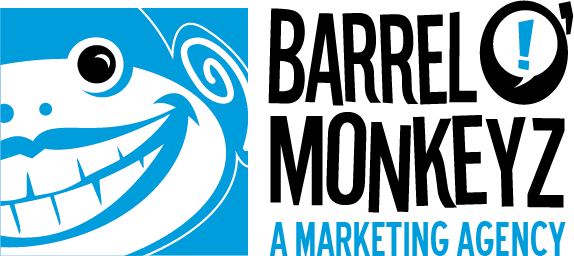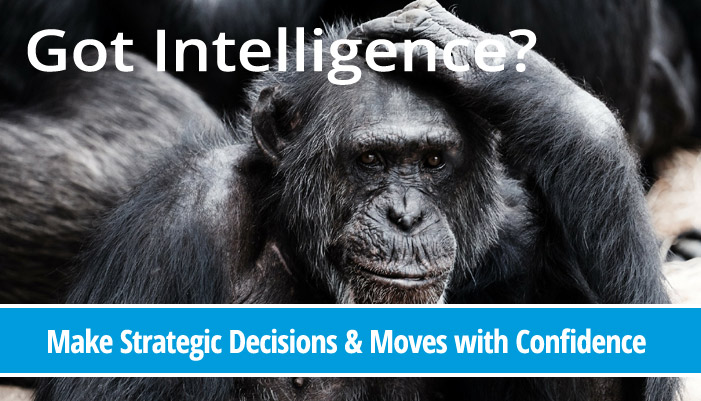Do you value market intelligence, or do you just assume you know your marketplace and customer motivations? Far too often, this King Monkey has seen the gathering of market intelligence relegated to the “nice to have but not necessary” portion of marketing budgets.
At a recent brainstorming session with my team to discuss strategies and tactics for a new client, it quickly became apparent that we knew little about the market in which this company operated. We were making our best guesses based on our own assumptions, as well as the long held beliefs of the client. But were we right? How could we know?
When I first mention gathering Market Intelligence to a client or potential client, I can almost see them start to bristle—I can almost hear them start to say, “This is going to cost a lot of money isn’t it? And is it necessary? We know our customers and marketplace better than anyone else.”
I agree that successful companies often do know their customers and the marketplaces better than anyone else, but that doesn’t mean they know them well enough to make strategic decisions and moves with confidence.
The good news is that nowadays much of the competitor and industry information you need and want can be gleaned for free from the Internet, while collecting other market information can be aided through electronic automation (such as email, online tools, surveys), and often at a fraction of the cost such lengthy research and analysis used to take in the “old days,” pre-2000 or so.
That said, any company serious about growing their market share needs to be open to weighing the value that Market Intelligence can bring to the growth equation.
First, Let’s Define It
Market intelligence is gathering information about your industry, your competitors, your customers, and yourself.
- Trends in the industry: innovations, new technology, new ways of working or selling
- Who’s in, who’s out, and who’s new to the marketplace among your competitors
- What motivates people to buy your product or service, plus what motivates them to tell others about your brand
- A candid assessment of your brand—your strengths, shortcomings, where opportunities exist, ways you can leverage technologies and relationships . . . and don’t forget those pesky financials!
Let’s Collect It
While many companies know quite a bit about their markets, they rarely know everything, so they need to collect information.
Market Intelligence is usually broken into two categories: primary and secondary.
PRIMARY INTELLIGENCE refers to research typically done by you (or someone representing you) to get feedback and information directly from specific sources.
- Think focus groups, product and service demos, surveys, questionnaires, and interviews with target audiences such as customers, vendors, and suppliers.
- Large companies often work with outside agencies or research firms to put together a program designed to get the desired information, while smaller firms may be more inclined to use DIY tools such as online surveying.
SECONDARY MARKET intelligence refers to collecting information from various sources that you use to supplement and help support your efforts.
- Think internal company data (financials, sales, staffing levels), competitive data (positioning and who’s active in your market), and industry trends (what’s hot, what’s not, and what the future looks like).
- Gathering this information can typically be done through Internet research, accessing government and association data, and your own company’s internals. Many firms will either work with an outside agency or rely on their in-house marketing teams or personnel to do the legwork necessary, or in the case of entrepreneurs or small business owners, they may opt to do this research themselves.
Now Let’s Use It
Now that you’ve collected the data and crunched the numbers, what do you do with it? The first step, of course is to create a report that details what you found, how you found it, and what your findings mean to your company. Typically, this takes shape as an overall executive summary, supported by an overview of primary and secondary findings, and then supporting data points and methodology.
Secondly, and what should be the most obvious portion of the Market Intelligence process, is that you use what you learn to inform your decisions about who to market to, how, and where. You might be surprised to find out, however, that some companies don’t really know what to do with the information they’ve collected or paid someone else to collect.
In the old days (there I go dating myself again!), this kind of Market Intelligence too often would find its way into a large 3-ring binder and a dusty shelf in the marketing director or CEO’s office . . . and there it would sit. These days, it sadly finds its way far too often into a file in a folder on the company intranet . . . and there it sits.
Don’t let this happen to you! You’ve gathered your intelligence, now do something with it! Use what you learn to:
- Tailor your products and services, your customer service efforts, and your overall brand to meet the expressed needs of customers and potential customers. Think about it. People are telling you what they want from you and what it will take to make a purchase. How valuable is that?
- Appeal to customer motivations by addressing their pain points in your messaging. You’re making the products or services they want, now tell them why you, above all others, are their best solution.
- Differentiate yourself from your competitors. You now know what’s worked and not worked for your competitors, and you know what your customers want. Not set yourself apart from the crowd so the decision to buy from you vs. them is a no-brainer.
- React to industry innovations and new technology. It’s one thing to be #1 in the market once, it’s another to stay there year after year. Don’t get caught flat-footed. Market Intelligence can make you more nimble and boost your ability to respond to changes in the marketplace.
- Use the information to do an honest assessment of your company resources, expertise, and staffing levels. Can you do what needs to be done in-house? Where do you fall short and need some outside expertise?
Put your intelligence to the test.
Sales and marketing designed to grow your business and your bottom line can cost a lot of money. So when it comes to Market Intelligence, don’t be pennywise and pound foolish by failing to see the inherent value it provides in helping you form a clear understanding of your marketplace, the forces at work within it, and the strategies and tactics you need to adopt to be successful.
Paul June is King Monkey of BARREL O’MONKEYZ, a San Diego-based strategic marketing agency specializing in Sports and Active Lifestyle markets. We serve as a seasoned, outsourced marketing team for companies looking to ramp up sales and launch new products. Our barrel is full of talent and creative arms ready to prove we don’t just monkey around!

